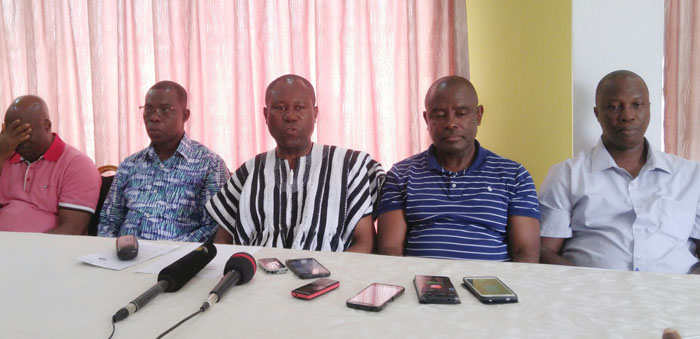Joseph Boahen-Aidoo flanked by his deputies
The Ghana Cocoa Board (COCOBOD) is to cut down and replant cocoa trees covering more than 10,000 hectares of farmland across three regions in the next 12 months as part of the rehabilitation of farms affected by the swollen-shoot disease.
Joseph Boahen-Aidoo, Chief Executive Officer (CEO) of COCOBOD, who announced this, said the exercise would begin on August 23, 2018 at Pillar 34 at Yamatwia in the Western Region.
Addressing the media in Kumasi as part of a three-day working tour of the Ashanti Region, Mr Aidoo said the move is in line with government’s programmes to improve farmers’ productivity and the country’s overall cocoa production.
He mentioned that the exercise would be conducted in the Eastern, Ashanti and Western Regions, adding that this is a sub-regional programme being organized in collaboration with Ivory Coast.
“We are challenged as an industry. There are these long-standing problems of low yield on the farms- on the average three bags per acre land – lowest in the world. That comes to 680,000 hectares of cocoa farmland. This stock of cocoa trees ought to be cut and replanted,” he explained.
The COCOBOD Chief Executive said aging of farmers and unattractive nature of the industry to the youth had compounded the challenges in the cocoa sector besides price volatility on the international market.
“Indeed, from 2016 up to early part of this year (2018), precisely January 18, the price of cocoa on the international market fell by about 35 percent from $2,100 to $1,800 per tonne. It tried to recover in February and went to an average of $2,500.
He continued: “As we speak today, the price is $2,100 per tonne. There are implications for this volatility.”
Mr. Boahen-Aidoo stated that in spite of the challenges, management of COCOBOD is determined to sustain the industry since cocoa remains the dominant export commodity for Ghana.
“We also have a large number of our population involved directly or indirectly in the industry. And therefore we cannot watch for such an important industry that has sustained the economy of this country for the longest while to collapse,” he affirmed.
He indicated that the management has put in place a number of interventions to ensure that cocoa farmers remain in business, and noted that these interventions could be seen in the areas of hand pollination exercise, mass pruning of cocoa trees and spring time spraying of cocoa trees.
“All these are being done with the view of improving the productivity of the farmer who is the fulcrum of the industry’s sustainability programmes,” he disclosed.
900,000 production target
He stated that COCOBOD is targeting a production figure of 900,000 metric tonnes for 2018/2019 crop season, which begins in October 1, 2018, having achieved 968,000 metric tonnes last year after targeting 850,000 metric tonnes.
According to him, so far 824,000 metric tonnes has been realised from the main crop production for the 2017/2018 crop season.
“We are yet to add the large crop beans to this figure,” he added.
He revealed that Parliament had approved $1.3 billion, adding that five key banks offshore are doing the syndication for COCOBOD.
“Hopefully on September, 20, 2018, we will sign for the amount. It is intended for purchases of cocoa in the country and other operational activities,” the COCOBOD boss said.
Sensitive Cocoa market
Touching on the sensitivity of the industry, Mr. Boahen-Aidoo said: “When a country is not producing much or production is going down, it becomes difficult for it to syndicate. This is because the banks become skeptical of the country’s ability to pay back monies given by the banks.
“When we report about low production we face a challenge with the financial market getting syndication. However, if you report increased production too, it also has its own consequences because the industry is filled with lots of speculators and hedgers who have the funds to buy the cocoa.
“Anything that affects Cote d’Ivoire squarely affects cocoa prices on daily basis. On one occasion a cocoa activist was beaten there and prices went up as a result. “This is an example of the sensitivity of the industry, and therefore the Ghanaian media should be circumspect on issues of cocoa so that farmers and the country do not suffer unduly,’ he said.
From Ernest Kofi Adu, Kumasi


